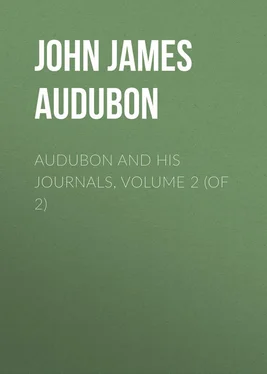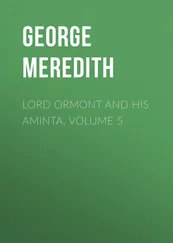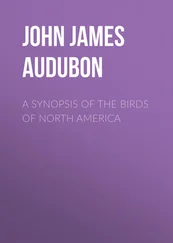John Audubon - Audubon and his Journals, Volume 2 (of 2)
Здесь есть возможность читать онлайн «John Audubon - Audubon and his Journals, Volume 2 (of 2)» — ознакомительный отрывок электронной книги совершенно бесплатно, а после прочтения отрывка купить полную версию. В некоторых случаях можно слушать аудио, скачать через торрент в формате fb2 и присутствует краткое содержание. Жанр: foreign_antique, foreign_prose, на английском языке. Описание произведения, (предисловие) а так же отзывы посетителей доступны на портале библиотеки ЛибКат.
- Название:Audubon and his Journals, Volume 2 (of 2)
- Автор:
- Жанр:
- Год:неизвестен
- ISBN:нет данных
- Рейтинг книги:5 / 5. Голосов: 1
-
Избранное:Добавить в избранное
- Отзывы:
-
Ваша оценка:
- 100
- 1
- 2
- 3
- 4
- 5
Audubon and his Journals, Volume 2 (of 2): краткое содержание, описание и аннотация
Предлагаем к чтению аннотацию, описание, краткое содержание или предисловие (зависит от того, что написал сам автор книги «Audubon and his Journals, Volume 2 (of 2)»). Если вы не нашли необходимую информацию о книге — напишите в комментариях, мы постараемся отыскать её.
Audubon and his Journals, Volume 2 (of 2) — читать онлайн ознакомительный отрывок
Ниже представлен текст книги, разбитый по страницам. Система сохранения места последней прочитанной страницы, позволяет с удобством читать онлайн бесплатно книгу «Audubon and his Journals, Volume 2 (of 2)», без необходимости каждый раз заново искать на чём Вы остановились. Поставьте закладку, и сможете в любой момент перейти на страницу, на которой закончили чтение.
Интервал:
Закладка:
June 24, Saturday. Bell killed a small Wolf last night, and Harris wounded another. This morning Provost started at daylight, and Bell followed him; but they returned without game. After breakfast Harris went off on horseback, and brought in a Sharp-tailed Grouse. He saw only one Deer, species not identified. Sprague and I went off last, but brought in nothing new. This afternoon I thought would be a fair opportunity to examine the manners of Sprague's Lark on the wing. Bell drove Peter for me, and I killed four Larks; we then watched the flight of several. The male rises by constant undulations to a great height, say one hundred yards or more; and whilst singing its sweet-sounding notes, beats its wings, poised in the air like a Hawk, without rising at this time; after which, and after each burst of singing, it sails in divers directions, forming three quarters of a circle or thereabouts, then rises again, and again sings; the intervals between the singing are longer than those which the song occupies, and at times the bird remains so long in the air as to render it quite fatiguing to follow it with the eye. Sprague thought one he watched yesterday remained in the air about one hour. Bell and Harris watched one for more than half an hour, and this afternoon I gazed upon one, whilst Bell timed it, for thirty-six minutes. We continued on to Fort Mortimer to see its condition, were received as kindly as yesterday, and saw the same persons. It was four o'clock, and the men were all at dinner, having been obliged to wait until this time because they had no meat in the fort, and their hunters had returned only one hour and a half before. We found that the river had fallen about fourteen inches since last evening, and the men would not remove for the present. On our way homeward Bell shot a fifth Lark, and when we reached the ravine I cut out of a tree-stump the nest of an Arctic Bluebird, with six eggs in it, of almost the same size and color as those of the common Bluebird. Sprague had brought a female of his Lark, and her nest containing five eggs; the measurements of these two species I will write out to-morrow. Our Buffalo hunters are not yet returned, and I think that Squires will feel pretty well fatigued when he reaches the fort. Mr. Culbertson presented me with a pair of stirrups, and a most splendid Blackfoot crupper for my saddle. The day has been warm and clear. We caught seven catfish at the river near the fort, and most excellent eating they are, though quite small when compared with the monsters of this species on the Missouri below.
June 25, Sunday. This day has been warm and the wind high, at first from the south, but this afternoon from the north. Little or nothing has been done in the way of procuring birds or game, except that Harris and Mr. Denig brought in several Arkansas Flycatchers. Not a word from the hunters, and therefore they must have gone far before they met Buffaloes. A few more catfish have been caught, and they are truly excellent.
June 26, Monday. The hunters returned this afternoon about three o'clock; i. e. , Squires and McKenzie; but the carts did not reach the fort till after I had gone to bed. They have killed three Antelopes, three bull Buffaloes, and one Townsend's Hare, but the last was lost through carelessness, and I am sorry for it. The men had eaten one of the Antelopes, and the two others are fine males; Bell skinned one, and saved the head and the fore-legs of the other. One of them had the tips of the horns as much crooked inwardly (backwards) as the horns of the European Chamois usually are. This afternoon early Provost brought in a Deer of the large kind, and this also was skinned. After this Harris and Bell went off and brought in several Lazuli Finches, and a black Prairie Lark Finch of the species brought from the Columbia by Townsend and Nuttall. We caught several catfish and a very curious sturgeon, of which Sprague took an outline with the camera, and I here give the measurements… It had run on the shore, and was caught by one of the men. I made a bargain this morning with the hunter Bonaventure Le Brun to procure me ten Bighorns, at $10.00 apiece, or the same price for any number he may get. Mr. Culbertson lent him old Peter, the horse, and I wrote a petit billet to Mr. John Collins, to ask him to have them ferried across the river, as our boat was away on a wood-cutting expedition. As Le Brun did not return, of course he was taken across, and may, perhaps, come back this evening, or early to-morrow morning, with something worth having. At this moment Bell has shot a Wolf from the ramparts, and sadly crippled another, but it made off somehow.
June 27, Tuesday. This morning was quite cool, and the wind from the north. After breakfast Bell and Owen McKenzie went off on horseback on this side of the river, to see how far off the Buffaloes are, and they may probably bring home some game. Sprague and I have been drawing all day yesterday and most of to-day. Provost has been making whistles to call the Deer; later he, Harris, and I, walked to the hills to procure the black root plant which is said to be the best antidote for the bite of the rattlesnake. We found the root and dug one up, but the plant is not yet in bloom. The leaves are long and narrow, and the flowers are said to resemble the dwarf sunflower. Harris shot two of what he calls the Small Shore Lark, male and female; but beyond the size being a little smaller than those found at Labrador, I cannot discover any specific difference. From the top of the hills we saw a grand panorama of a most extensive wilderness, with Fort Union beneath us and far away, as well as the Yellowstone River, and the lake across the river. The hills across the Missouri appeared quite low, and we could see the high prairie beyond, forming the background. Bell and McKenzie returned, having shot a Wolf in a curious manner. On reaching the top of a hill they found themselves close to the Wolf. Bell's horse ran quite past it, but young McKenzie shot and broke one fore-leg, and it fell. Bell then gave his horse to McKenzie, jumped off, ran to the Wolf, and took hold of it by the tail, pulling it towards the horses; but it got up and ran rapidly. Bell fired two shots in its back with a pistol without stopping it, then he ran as fast as he could, shot it in the side, and it fell. Bell says its tail was longer than usual, but it was not measured, and the Wolf was left on the prairie, as they had no means of bringing it in. They saw an Antelope, some Magpies, and a Swift Fox, but no Buffaloes, though they were fifteen miles from the fort. They ran a Long-tailed Deer, and describe its movements precisely as do Lewis and Clark. 31Between every three or four short leaps came the long leap of fully twenty-five feet, if not more. The Kit or Swift Fox which they saw stood by a bunch of wormwood, and whilst looking at the hunters, was seen to brush off the flies with his paws.
I am now going to take this book to Lewis Squires and ask him to write in it his account of the Buffalo hunt.
(The following is in Mr. Squires' handwriting:)
"By Mr. Audubon's desire I will relate the adventures that befell me in my first Buffalo hunt, and I am in hopes that among the rubbish a trifle, at least, may be obtained which may be of use or interest to him. On the morning of Friday, the 23d, before daylight, I was up, and in a short time young McKenzie made his appearance. A few minutes sufficed to saddle our horses, and be in readiness for our contemplated hunt. We were accompanied by Mr. Bonaventure the younger, one of the hunters of the fort, and two carts to bring in whatever kind of meat might be procured. We were ferried across the river in a flatboat, and thence took our departure for the Buffalo country. We passed through a wooded bottom for about one mile, and then over a level prairie for about one mile and a half, when we commenced the ascent of the bluffs that bound the western side of the Missouri valley; our course then lay over an undulating prairie, quite rough, and steep hills with small ravines between, and over dry beds of streams that are made by the spring and fall freshets. Occasionally we were favored with a level prairie never exceeding two miles in extent. When the carts overtook us, we exchanged our horses for them, and sat on Buffalo robes on the bottom, our horses following on behind us. As we neared the place where the Buffaloes had been killed on the previous hunt, Bonaventure rode alone to the top of a hill to discover, if possible, their whereabouts; but to our disappointment nothing living was to be seen. We continued on our way watching closely, ahead, right and left. Three o'clock came and as yet nothing had been killed; as none of us had eaten anything since the night before, our appetites admonished us that it was time to pay attention to them. McKenzie and Bonaventure began to look about for Antelopes; but before any were 'comeatable,' I fell asleep, and was awakened by the report of a gun. Before we, in the carts, arrived at the spot from whence this report proceeded, the hunters had killed, skinned, and nearly cleaned the game, which was a fine male Antelope. I regretted exceedingly I was not awake when it was killed, as I might have saved the skin for Mr. Audubon, as well as the head, but I was too late. It was now about five o'clock, and one may well imagine I was somewhat hungry. Owen McKenzie commenced eating the raw liver, and offered me a piece. What others can eat, I felt assured I could at least taste. I accordingly took it and ate quite a piece of it; to my utter astonishment, I found it not only palatable but very good; this experience goes far to convince me that our prejudices make things appear more disgusting than fact proves them to be. Our Antelope cut up and in the cart, we proceeded on our 'winding way,' and scarcely had we left the spot where the entrails of the animal remained, before the Wolves and Ravens commenced coming from all quarters, and from places where a minute before there was not a sign of one. We had not proceeded three hundred yards at the utmost, before eight Wolves were about the spot, and others approaching. On our way, both going and returning, we saw a cactus of a conical shape, having a light straw-colored, double flower, differing materially from the flower of the flat cactus, which is quite common; had I had any means of bringing one in, I would most gladly have done so, but I could not depend on the carts, and as they are rather unpleasant companions, I preferred awaiting another opportunity, which I hope may come in a few days. We shot a young of Townsend's Hare, about seven or eight steps from us, with about a dozen shot; I took good care of it until I left the cart on my return to the fort, but when the carts arrived it had carelessly been lost. This I regretted very much, as Mr. Audubon wanted it. It was nearly sunset when Bonaventure discovered a Buffalo bull, so we concluded to encamp for the night, and run the Buffaloes in the morning. We accordingly selected a spot near a pond of water, which in spring and fall is quite a large lake, and near which there was abundance of good pasture; our horses were soon unsaddled and hoppled, a good fire blazing, and some of the Antelope meat roasting on sticks before it. As soon as a bit was done, we commenced operations, and it was soon gone 'the way of all flesh.' I never before ate meat without salt or pepper, and until then never fully appreciated these two luxuries , as they now seemed, nor can any one, until deprived of them, and seated on a prairie as we were, or in some similar situation. On the opposite side of the lake we saw a Grizzly Bear, but he was unapproachable. After smoking our pipes we rolled ourselves in our robes, with our saddles for pillows, and were soon lost in a sound, sweet sleep. During the night I was awakened by a crunching sound; the fire had died down, and I sat up and looking about perceived a Wolf quietly feeding on the remains of our supper. One of the men awoke at the same time and fired at the Wolf, but without effect, and the fellow fled; we neither saw nor heard more of him during the night. By daylight we were all up, and as our horses had not wandered far, it was the work of a few minutes to catch and saddle them. We rode three or four miles before we discovered anything, but at last saw a group of three Buffaloes some miles from us. We pushed on, and soon neared them; before arriving at their feeding-ground, we saw, scattered about, immense quantities of pumice-stone, in detached pieces of all sizes; several of the hills appeared to be composed wholly of it. As we approached within two hundred yards of the Buffaloes they started, and away went the hunters after them. My first intention of being merely a looker-on continued up to this moment, but it was impossible to resist following; almost unconsciously I commenced urging my horse after them, and was soon rushing up hills and through ravines; but my horse gave out, and disappointment and anger followed, as McKenzie and Bonaventure succeeded in killing two, and wounding a third, which escaped. As soon as they had finished them, they commenced skinning and cutting up one, which was soon in the cart, the offal and useless meat being left on the ground. Again the Wolves made their appearance as we were leaving; they seemed shy, but Owen McKenzie succeeded in killing one, which was old and useless. The other Buffalo was soon skinned and in the cart. In the meantime McKenzie and I started on horseback for water. The man who had charge of the keg had let it all run out, and most fortunately none of us had wanted water until now. We rode to a pond, the water of which was very salt and warm, but we had to drink this or none; we did so, filled our flasks for the rest of the party, and a few minutes afterward rejoined them. We started again for more meat to complete our load. I observed, as we approached the Buffaloes, that they stood gazing at us with their heads erect, lashing their sides with their tails; as soon as they discovered what we were at, with the quickness of thought they wheeled, and with the most surprising speed, for an animal apparently so clumsy and awkward, flew before us. I could hardly imagine that these enormous animals could move so quickly, or realize that their speed was as great as it proved to be; and I doubt if in this country one horse in ten can be found that will keep up with them. We rode five or six miles before we discovered any more. At last we saw a single bull, and while approaching him we started two others; slowly we wended our way towards them until within a hundred yards, when away they went. I had now begun to enter into the spirit of the chase, and off I started, full speed, down a rough hill in swift pursuit; at the bottom of the hill was a ditch about eight feet wide; the horse cleared this safely. I continued, leading the others by some distance, and rapidly approaching the Buffaloes. At this prospect of success my feelings can better be imagined than described. I kept the lead of the others till within thirty or forty yards of the Buffaloes, when I began making preparations to fire as soon as I was sufficiently near; imagine, if possible, my disappointment when I discovered that now, when all my hopes of success were raised to the highest pitch, I was fated to meet a reverse as mortifying as success would have been gratifying. My horse failed, and slackened his pace, despite every effort of mine to urge him on; the other hunters rushed by me at full speed, and my horse stopped altogether. I saw the others fire; the animal swerved a little, but still kept on. After breathing my horse a while, I succeeded in starting him up again, followed after them, and came up in time to fire one shot ere the animal was brought down. I think that I never saw an eye so ferocious in expression as that of the wounded Buffalo; rolling wildly in its socket, inflamed as the eye was, it had the most frightful appearance that can be imagined; and in fact, the picture presented by the Buffalo as a whole is quite beyond my powers of description. The fierce eyes, blood streaming from his sides, mouth, and nostrils, he was the wildest, most unearthly-looking thing it ever fell to my lot to gaze upon. His sufferings were short; he was soon cut up and placed in the cart, and we retraced our steps homeward. Whilst proceeding towards our camping-ground for the night, two Antelopes were killed, and placed on our carts. Whenever we approached these animals they were very curious to see what we were; they would run, first to the right, and then to the left, then suddenly run straight towards us until within gun-shot, or nearly so. The horse attracted their attention more than the rider, and if a slight elevation or bush was between us, they were easily killed. As soon as their curiosity was gratified they would turn and run, but it was not difficult to shoot before this occurred. When they turned they would fly over the prairie for about a mile, when they would again stop and look at us. During the day we suffered very much for want of water, and drank anything that had the appearance of it, and most of the water, in fact all of it, was either impregnated with salt, sulphur, or magnesia – most disgusting stuff at any other time, but drinkable now. The worst of all was some rain-water that we were obliged to drink, first placing our handkerchiefs over the cup to strain it, and keep the worms out of our mouths. I drank it, and right glad was I to get even this. We rode about five miles to where we encamped for the night, near a little pond of water. In a few minutes we had a good fire of Buffalo dung to drive away mosquitoes that were in clouds about us. The water had taken away our appetites completely, and we went to bed without eating any supper. Our horses and beds were arranged as on the previous evening. McKenzie and I intended starting for the fort early in the morning. We saw a great many Magpies, Curlews, Plovers, Doves, and numbers of Antelopes. About daylight I awoke and roused McKenzie; a man had gone for the horses, but after a search of two hours returned without finding them; all the party now went off except one man and myself, and all returned without success except Bonaventure, who found an old horse that had been lost since April last. He was despatched on this to the fort to get other horses, as we had concluded that ours were either lost or stolen. As soon as he had gone, one of the men started again in search of the runaways, and in a short time returned with them. McKenzie and I soon rode off. We saw two Grizzly Bears at the lake again. Our homeward road we made much shorter by cutting off several turns; we overtook Bonaventure about four miles from our encampment, and passed him. We rode forty miles to the fort in a trifle over six hours. We had travelled in all about one hundred and twenty miles. Bonaventure arrived two hours after we did, and the carts came in the evening."
Читать дальшеИнтервал:
Закладка:
Похожие книги на «Audubon and his Journals, Volume 2 (of 2)»
Представляем Вашему вниманию похожие книги на «Audubon and his Journals, Volume 2 (of 2)» списком для выбора. Мы отобрали схожую по названию и смыслу литературу в надежде предоставить читателям больше вариантов отыскать новые, интересные, ещё непрочитанные произведения.
Обсуждение, отзывы о книге «Audubon and his Journals, Volume 2 (of 2)» и просто собственные мнения читателей. Оставьте ваши комментарии, напишите, что Вы думаете о произведении, его смысле или главных героях. Укажите что конкретно понравилось, а что нет, и почему Вы так считаете.












